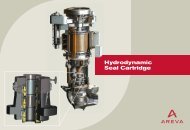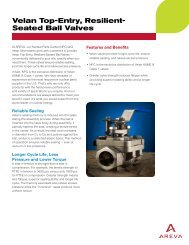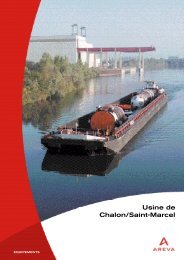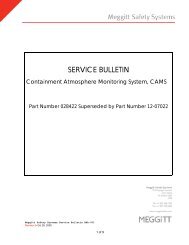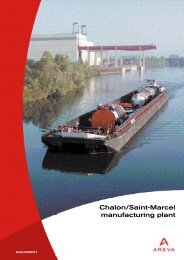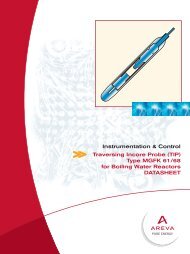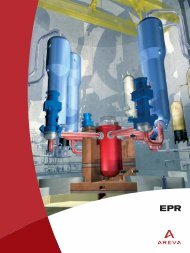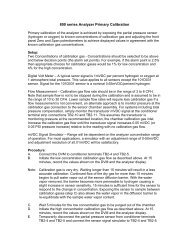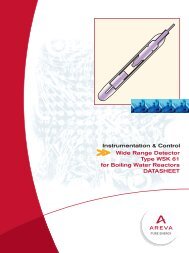Download - AREVA
Download - AREVA
Download - AREVA
- No tags were found...
You also want an ePaper? Increase the reach of your titles
YUMPU automatically turns print PDFs into web optimized ePapers that Google loves.
FeaturesNew Filters RecoverMegawatts at PickeringZebra mussels, a small molluskmeasuring about one and onehalf inches (3.81 centimeters) longby .75 inches (1.9 centimeters) widein their adult form, infested thecondenser cooling water intakes at theOntario Power Generation’s four-unitPickering B nuclear plant in Canada.They were robbing it of an averageof 5-15 MW per unit and a total of8,000 man hours in yearly maintenance.Ontario Power Generation (OPG)teamed up with Framatome ANPand Taprogge America Corporation tofashion and install in-line debrisfilters that have reduced maintenanceexpenses and returned generationcapacity to the plant.The extraordinarily prolific andpersistent zebra mussel – drawing itsname from stripes on its shell – cameto the Great Lakes in the ballast ofcommercial ships from abroad in the1980s. Today, very heavy concentrationsof the mussel are noted throughoutthe Great Lakes states and in theMississippi River basin, with the molluskpushing its invasion into the St.Lawrence waterway, Lake Champlain,and the Tennessee River Valley.Zebra mussels attach to any solidsurface. They have invaded watersupply pipes of hydroelectric, nuclearand fossil power plants, public watersupply plants, and industrial facilities.The mussels colonize pipes and constrictflow reducing the intake in heatexchangers, condensers, fire fightingequipment, air conditioning, andcooling systems. The diametersof pipes have been reduced by up totwo-thirds at water treatment facilities,according to a US GeologicalSurvey report.The economic impact of the invadingmollusks is felt most heavily in the8Masses of zebra musselsseverely reduce water flow inthe condenser.power generation industry, with anaverage expenditure of $786,670 perplant recorded in a landmark 1995economic impact study.The Pickering B facility uses LakeOntario water in its condenser coolingwater (CCW) system. Mussel larvaeare small enough to pass throughprimary CCW intake screening andattach themselves to intake canalsurfaces and form colonies. As theymature, the mussels and their shellsenter condenser water inlet boxes andbecome lodged in condenser tubesheets and within condenser tubes.Flow of water through the condenseris reduced, degrading condenser andcondenser tube cleaning systemperformance, and resulting in reducedgenerating capability, lost electricgeneration revenues, and increasedmaintenance costs to manually removethe mussels.While acting as “design agent”,Framatome ANP supported the Pickeringselection of a Taprogge AmericaCorporation PR-BW800 debris filterdesign for adaptation and installation inthe six 72-inch (1.8 meters)-diameterinlets of each of the four Pickering Bunits during scheduled outages over athree-year period ending in 2003. Thedebris filter mechanism was customengineered by Taprogge to fit withinthe flange-to-flange space of anexisting 72-inch (1.8 meters) isolationvalve that was relocated, minimizingretrofitting requirements.Wayne Allen, Project Leader atPickering B, reports that the newequipment is “performing as expected.”Allen further states: “The filtersautomatically remove the mussels andother debris and, with the operationof the condenser tube cleaning system,has restored generation output andreduced maintenance expenditures,with the net result of increasedrevenue for OPG.” ■Not only are these pesky mussels a widespread problem inNorth America, they can be found in Europe and other parts ofthe world.Source: US Geological Society



